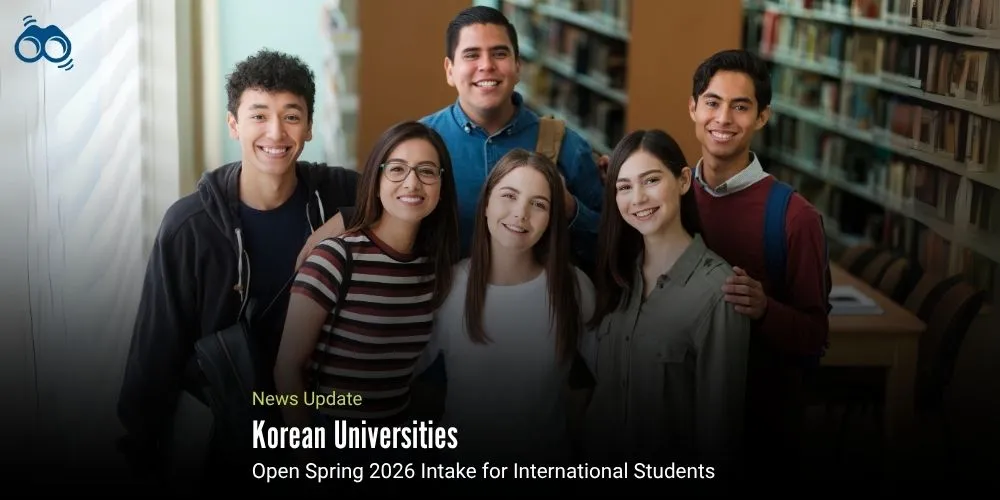As Visa Rules Tighten Globally, Students Look to South Korea for Academic Opportunities
Yonsei, Seoul National, and Chung-Ang Lead Spring 2026 Admissions for Overseas Applicants
As leading study destinations such as the United States, the United Kingdom, Canada, and Australia continue to tighten visa regulations and impose more restrictive immigration policies, international students are increasingly exploring alternative pathways to pursue higher education abroad. In this context, countries including South Korea, Japan, France, Finland, and Azerbaijan have positioned themselves as promising academic hubs, each launching strategic initiatives to attract global talent. Notably, South Korea has set a target of hosting 300,000 international students by 2027, while Japan plans to welcome 400,000 by 2033 and France aims for 500,000 by 2027, with a particular emphasis on engaging Indian students.
Aligning with this trend, South Korean universities have commenced the first phase of spring 2026 undergraduate admissions for international applicants. Several institutions have introduced newly tailored majors to better serve global academic interests, signalling a broader commitment to inclusivity and educational diversity. Among these, Yonsei University stands out with its plans to offer special transfer admissions throughout the year, thereby increasing access for overseas students affected by changes in visa policies elsewhere.
In terms of timelines, Seoul National University is accepting applications from 7–10 July, with recommendation letters due by 11 July and admissions results expected on 16 October and 21 November. Similarly, Hongik University will open its admissions window from 17–24 July for the spring 2026 intake. A significant procedural update has also been announced: following recent amendments to the Higher Education Act, mandatory personal statements and study plans are being reinstated for international applicants beginning with the autumn 2025 intake, with Hongik University requiring these documents starting from spring 2026.
Yonsei University and its Underwood International College (UIC) will each host separate admissions cycles. Yonsei will accept applications from 1–12 September, with results announced on 5 December, while UIC, which offers English-medium programmes, will take applications from 25 August to 17 October, conduct online interviews on 12 December, and release final results on 19 December.
Additionally, Yonsei will open a dedicated spring 2026 transfer admission track for foreign nationals and overseas Koreans currently enrolled as sophomores or juniors in international universities. This extended timeline from 2 September to 4 December has been designed to accommodate those impacted by the student visa crisis in the United States. In terms of evaluation criteria, Yonsei has shared a preliminary admissions framework: foreign applicants will be assessed based on Korean language proficiency (30%), English test scores (30%), and academic records (40%). For overseas Koreans, university grades will substitute for the Korean language requirement. Full admissions guidelines are expected by late July.
Chung-Ang University will also welcome international undergraduate applications in two rounds: the first from 1–19 September (results on 31 October), and the second from 12–26 November (results on 19 December). Beginning spring 2026, the university will offer new majors designed exclusively for international students, such as Korean Language Education & Korean Culture, Global Advertising & PR, and Global Interactive Convergence Content. This evolving landscape underscores how South Korea is strategically adapting its higher education system to support international student mobility and academic inclusion.
Editor’s Note:
As traditional study destinations tighten visa regulations and limit access, South Korea is emerging as a forward-thinking alternative for international students. Through new academic programmes, flexible transfer pathways, and inclusive admissions policies, institutions like Yonsei University and Chung-Ang University are leading a shift toward greater global accessibility. Rather than merely responding to global disruptions, South Korea is actively reshaping its higher education landscape to welcome a broader and more diverse student population. This proactive stance reflects the nation’s long-standing commitment to international collaboration and also strengthens its position as a dynamic and inclusive hub for global education.
Skoobuzz believes that the inclusive approach taken by South Korean universities represents a meaningful shift in educational reform, rooted in adaptability, empathy, and a willingness to rethink traditional systems. This mindset reflects a broader vision to make global education more accessible, responsive, and future-ready.














0 Comments (Please Login To Continue)